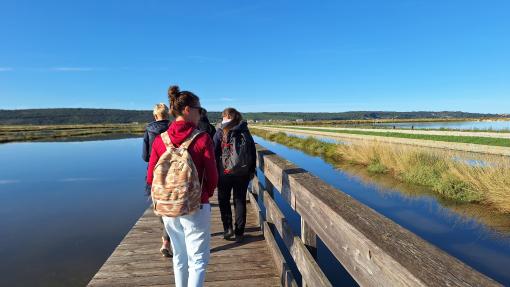As part of the E-NAT2CARE project, the Škocjan Caves Park organized a professional seminar for the mentors of the Škocjan Caves Park school network on Saturday, October 12, 2024. The seminar's topic was "The Impact of Climate Change on Plant and Animal Species."
Twenty mentors from nine primary schools and experts from Škocjan Caves Park participated in the seminar. The seminar began with an introduction to the E-NAT2CARE project. In the Sečovlje Saltpans Nature Park, we were welcomed by Iztok Škornik, a nature conservation expert, who introduced us to the unique features of the Sečovlje Saltpans area and the integration of cultural heritage protection with nature conservation. We explored which birds overwinter and nest in the Sečovlje Saltpans Nature Park. Škornik explained the conservation measures used to maintain a suitable environment for various bird species that depend on the coastal zone. He highlighted the pied avocet (Recurvirostra avosetta), an elegant black-and-white bird with long legs and an upward-curved black beak, the Kentish plover (Charadrius alexandrinus), and the little ringed plover (Charadrius dubius), which are mainly threatened by river interventions and regulations as they nest on river gravel bars. Škornik also pointed out how climate change is affecting bird occurrences, using the white stork (Ciconia ciconia) as an example. Due to increasingly mild winters, some storks no longer migrate to Africa but stay in Slovenia during the winter.
In Osp, Prof. Dr. Boštjan Surina from the Natural History Museum in Rijeka introduced us to the geological features of the cliffs above Osp and presented the flora that has evolved and adapted to these conditions over time. He particularly emphasized Moehringia tommasinii, an endemic plant of the Slovenian Karst, parts of Italy, and Croatia. In Slovenia, it grows in only three locations on the Karst Edge. Due to its small natural habitat, the plant is protected in Slovenia and is also a qualifying species of the Natura 2000 Karst area, listed also on the Red List. It is threatened by sport climbing and the spread of the invasive species Virginia creeper (Parthenocissus quinquefolia).
At the end of the seminar, the mentors presented various ideas on how to transfer the acquired knowledge into practical work with children

